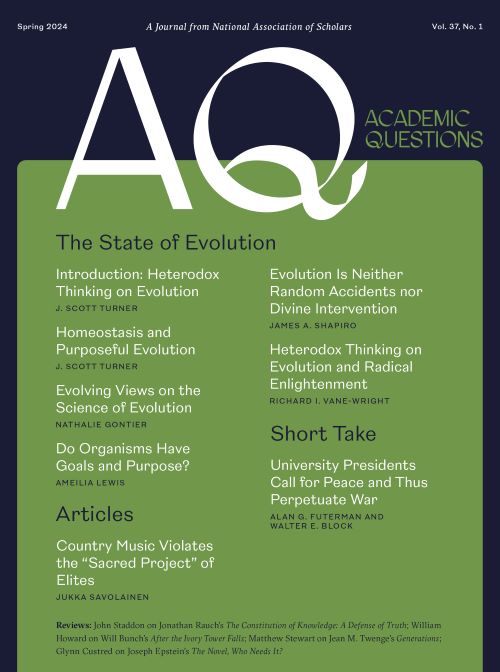Evolution should be an important presence in our culture. According to a position statement issued by the National Science Teaching Association (NSTA),1 evolution is a “major unifying concept in science.” No argument there, really. After all, our understanding of evolution has deep things to say about some very deep questions. What are we? How did we come to be? What is our relationship with the natural world? The implications are not only scientific, but cultural as well.
So, how odd it should be that fully half the NSTA’s aforementioned position statement is devoted to things teachers should avoid when the subject is evolution. The world is divided in two: the scientific, and the religious. Evolution is science, not religion, and never should one stray into the other’s turf. Nor should science teachers depart from evolution’s “settled science,” and the boundaries are helpfully staked out in the widely adopted Next Generation Science Standards (NGSS) on evolution.2 In case you are wondering, the fenced-off territory is strictly Darwinian. Evolution is through descent from common ancestry, full stop. Natural selection is the only scientifically valid explanation for evolution, full stop. Fitness is differential reproduction in populations, full stop. Selection of favored genes is how evolution works, full stop. Lest one thinks this is a problem limited to K-12 education, post-secondary teaching about evolution is scarcely better. In our teaching evolution, and in our conversations about evolution generally, On the Origin of Species is the biological equivalent to Euclid’s Elements for geometry. Darwinism is axiomatic, from which all things follow.
What is most curious here is the disconnect of the teaching of evolution from the actual science of evolution. Where the NGSS standards treat Darwinism as settled science, actual evolutionary science is a rich froth of competing ideas and vigorous discussion: nothing settled there! One cannot help asking: why isn’t our teaching of evolution leavened with this intoxicating liquor?
Part of the problem is that the public perception of evolution is Manichaeistic: there is either Darwinism (good), or creationism (bad), and we all must choose one or the other. The public square, which would ordinarily be the place to engage constructively with the questions and challenges of evolution, is presently a no-man’s land between two entrenched opponents. Those who dare venture there, such as Thomas Nagel,3 are strafed with fire. The irony here is that neither side is particularly well-connected to the actual science of evolution.
The Third Way of Evolution is an informal assemblage of eighty scientists and philosophers of science who are determined to re-occupy that evolutionary no-man’s land (full disclosure, I am one of them). They range from molecular biologists to naturalists to physicists to zoologists to philosophers. This collection of articles on heterodox thinking in evolution was drawn from five of them (one of which I contributed). They represent diverse ways of thinking, but they have certain things in common.
One common theme is a skepticism about the so-called Modern Synthesis, the 1930s reconciliation of Mendelian genetics, population genetics, and Darwinian selection that recast Darwin’s own Darwinism as gene selectionism (the NGSS standards on evolution are essentially the Modern Synthesis). The skepticism is not to doubt the science itself. The mid-twentieth century was a golden age for our understanding of heredity and the nature of the gene, and there is no reason to question that. Nevertheless, the mark of a healthy science is a kind of creative destruction of ideas. As we have learned more about the dynamic nature of heredity and the complexity of translating hereditary memory into the functioning organism, the genetic assumptions that underpinned the Modern Synthesis have been scrambled. This has opened doors to think today about evolution in ways that were unthinkable just a few decades ago.
Another common theme is a growing realization that agency is a powerful driver of evolutionary change. The Modern Synthesis, indeed Darwinism in general, was a program to establish a law-driven explanation for evolution. Paradoxically, the living organism was given little active part in the story: stripped of agency, in short. The organism was reduced to a mere vehicle for genes tossed about in turbulent and disembodied gene pools. Genes passed from one generation to the next through a “selective filter,” at the mercy of an environment that was sometimes benign and sometimes difficult or hostile but always impersonal. On a number of scientific fronts ranging from behavior to ecology, however, it is becoming ever more clear that living things actually exert a great deal of control over their own evolution: they have evolutionary agency, in other words. We are still coming to grips with what the restoration of agency means for evolution, because it raises a number of questions that could not even be asked a few years ago. What’s the nature of living agency? Do organisms, in some still poorly understood way, want to evolve? Is evolution somehow intelligent? Is it even possible any more to be a Darwinist?4
Finally, there is a common appreciation that our understanding of evolution is still very much a work in progress. Evolutionism has a rich intellectual history—evolution itself has evolved in other words—and this history is full of complexity, nuance, wrong turns, and unique insights. The Modern Synthesis has carried with it an unfortunate tendency to sweep this complicated history out of sight: why talk about error when the truth is right in front of us? Rather than teaching evolution in the “right” way, walled off in science classes, shouldn’t evolution rather be taught as a long discourse, marked with humility rather than dogma, as philosophy rather than doctrine? Wouldn’t we all be richer for it?
My hope is that this collection on heterodox thinking about evolution might encourage that discourse.
J. Scott Turner is Emeritus Professor of Biology, SUNY College of Environmental Science & Forestry & Director of Science Programs, National Association of Scholars.
1 NSTA Board of Directors, "N.S.T.A. Position Statement: The Teaching of Evolution," National Science Teaching Association, https://www.nsta.org/nstas-official-positions/teaching-evolution.
2 “HS.Natural Selection and Evolution,” Next Generation Science Standards, https://www.nextgenscience.org/topic-arrangement/hsnatural-selection-and-evolution.
3 T. Nagel, Mind and Cosmos: Why the Materialist Neo-Darwinian Conception of Nature Is Almost Certainly False (New York: Oxford University Press, 2012).
4 Full disclosure: I once was, but no longer am. See: J.S. Turner, Purpose and Desire. What Makes Something “Alive” and Why Modern Darwinism Has Failed to Explain It (New York: HarperOne, 2017).
Photo by Richie Nolan on Unsplash













